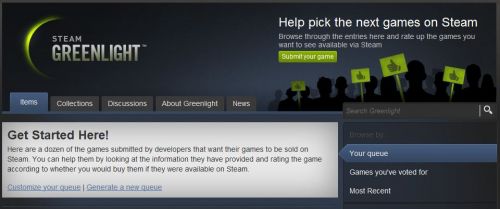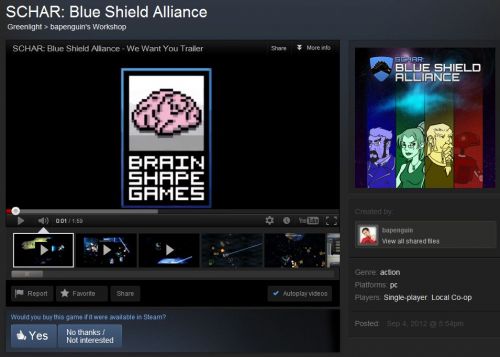Wyv and Keep has received great community support, and while we have no idea how long it'll take for it to be greenlit (we're still only at 1%... whatever that means!), until then the system provides us a great way to connect to hundreds of thousands of possible new fans. The 'collection' system may prove to be invaluable for developers as it gives players an easy way to find say, local co-op games, but I wonder if it will put pressure on journalists and big players in the community to either make their own collections or stay neutral.
- Jesse Bull, Lead Artist/Designer, A Jolly Corpse
The Power (?) of Voting
One major advantage (or disadvantage, depending on your viewpoint) to Steam’s Greenlight program is that it allows the gaming community to directly interface with a game’s developers. When looking at a game on Greenlight, you’re presented with the choice of “Would you play this game if it were available on Steam?” You select either “Yes” or “No thanks/Not interested,” and then can immediately go on to the next game. Voting “Yes” reveals a box that lets you know how many of the “necessary positive ratings” the game has received thus far, along with options to share your excitement via the usual social media outlets (i.e., Twitter, Facebook, reddit). As this yes/no mechanic can be a bit vague (and completely inscrutable to the developer), each game page includes a comments section where a member of the gaming community may leave a comment for the developers about what he/she specifically liked or disliked.
These comments would then, hypothetically, inform the developer about what he/she needs to do to get even more positive ratings and put a game out there that would be “Steam-worthy.” The developer may also use the comments section to reply back and get more feedback and ideas/thoughts, thereby improving his/her game. This is clearly the intention of this feature, but as with so many open forums on the Internet, the opportunity to voice one’s opinion can be a hard thing to resist for some. Comments like “meh; not supporting cause blatantly asking me to donate” or “nice clone of X game” are quite common, not to mention suggestions like “improve graphics” or “change the gameplay mechanics” for a game that is finished or nearing completion and is just seeking a new distribution outlet. These are certainly not all the comments that are left, and many gamers are trying to be genuinely helpful. It raises the question, though, of exactly how beneficial these comments can be.
This, essentially, ends the gamer’s part in the process; look at a game, read the description, possibly play a demo or even the full version of the game (if a link is provided), leave a comment, and then vote on it. “Word of mouth” marketing can be done by the gamer to his/her friends in order to try and increase the votes but it is Valve, ultimately, that has the final say about whether a game will get “greenlit.” Valve’s requirements for that to happen are still uncertain, as a game doesn’t need a 100% positive rating in order to get greenlit (the first 10 games that Valve has selected didn’t reach that point). This may leave some developers wondering what, exactly, does my $100 get me?
Right now I think it's too early to tell how Greenlight will do, but for the most part I think it's really limiting the chances of smaller indie devs of ever getting on Steam. That said... the $100 fee (or something slightly smaller) should have been there from the start, in my opinion.
- Nick Puleo, Lead Designer/Programming, Brain Shape Games
What Benjamin Franklin Can Do For You
The final requirements for submitting a game on Steam Greenlight are monetary in nature. In addition to a $100 fee, potential developers need a “valid and non-limited Steam account;” that means owning a game on Steam, so the total cost is around $105. Valve has said that they’re not interested in making any money off all this, so the $100 goes to the Child’s Play Charity (a good move on their part), and that the reason there’s even a fee in the first place is to keep the program from being flooded with joke submissions. There has been, of course, some reaction to this from the community – and with reason. Here’s a quick breakdown of what one Benjamin gets you from the various services out there:
- Microsoft Creators Club ($99): annual subscription fee to submit up to 10 games on Xbox Live Indie Games and all games are reviewed by peers within the Microsoft Creators Club community. Games may be developed using XNA tools for the PC for free, but a distribution platform (e.g., Steam, Desura, or your own website) would have to be setup
- iOS or Mac Developer Center ($99): annual subscription fee to develop as many apps for either mobile or Mac App Store and apps are reviewed by Apple
- Amazon Mobile App Developer ($99 per year, first year free): annual subscription fee to release as many mobile apps as you can develop and apps are reviewed by Amazon
- Android Publisher ($25): one-time fee to register a publisher account to release as man apps as you’d like and all apps are reviewed by Google
- Steam Greenlight ($100): one-time fee credited to Steam account that allows as many submissions as you wish with all submissions being voted upon by the gaming community to gauge interest in buying the game were it released on Steam platform
Looking through those offerings, one can see that there’s a stark difference between what Greenlight’s offering and what its “competitors” offer. An indie developer looking to get their game out to the public certainly may be better off going with one of the other choices out there, as there’s more of a guarantee that the game will see release. The benefit to this service (as it currently exists) would likely be seen more as a marketing venue, as opposed to any kind of easily accessed release platform for the game. The carrot being dangled - a full release on Steam - is enough to make it very tempting for the budding indie developer, provided he/she can be vocal enough within the Greenlight system to be heard above everyone else.

